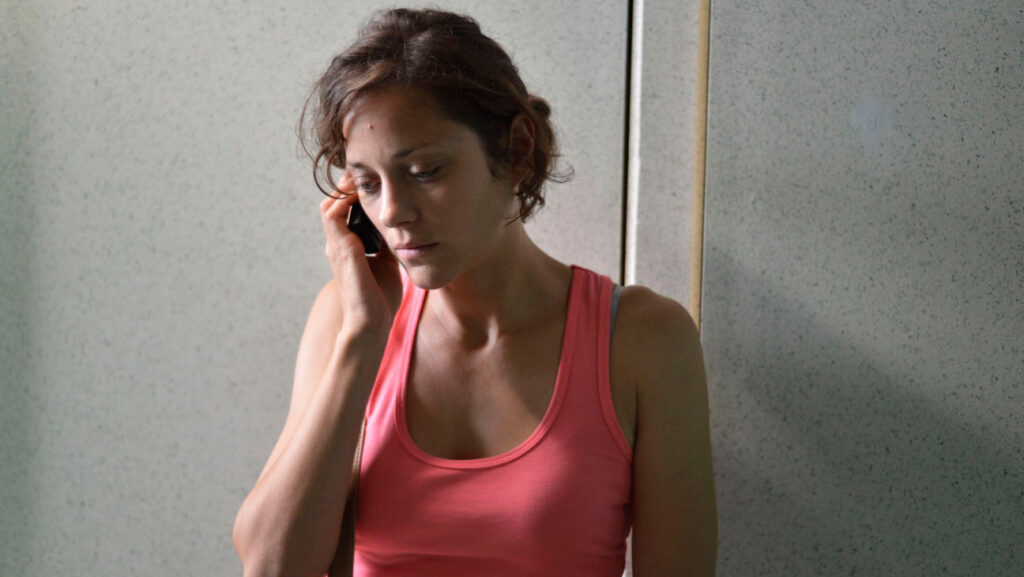In anticipation of the Academy Awards, we polled our contributors to see who they thought should win the Oscar. Once we had our winners, we asked various writers to make the case for our selection in each category. Here, Sheila O’Malley makes the case for the Best Actress of 2014: Marion Cotillard in “Two Days, One Night.” Two winners will be announced Monday through Thursday, ending in our choices for Best Picture and Best Director on Friday.
There are multiple relentless sources of pressure on Sandra (Marion Cotillard), the clinically depressed mother and wife at the center of “Two Days, One Night,” the new film from Belgian brother-team Jean-Pierre and Luc Dardenne. Sandra has been in treatment for depression, and things got so bad with her that it haunts her family still. She is not completely 100% when she gets laid off. Her co-workers were given a choice: receive a bonus, or give up the bonus so that Sandra could keep her job. Naturally, the majority of them chose the bonus. Over the course of one weekend, Sandra, already weakened by her illness, frog-marches herself from house to house, asking her former co-workers to reconsider. This would be a daunting task to someone who was well, but to Sandra it seems impossible.
The self-loathing which accompanies depression is crushing. How can she fight for herself when she feels that she is “nothing,” as she says at one point. The economic situation in her family is so dire (they need her salary) that she is forced to withstand all of those pressures, and keep trying. Her husband (the marvelous Fabrizio Rongione) is there as cheerleader, chauffeur and caretaker, bolstering her up, telling her she can do this, she can do this. Their relationship was one of the many moving elements of this tremendously moving film: his support of her is essential, even though she experiences it as unreasonable pressure. None of us are alone. When one is weak, one needs the strength of others, we all fluctuate, we need to try to take care of one another.
“Two Days, One Night” is a grueling experience but the overall mood ultimately is one of a sometimes-cautious and sometimes-explosive hope. Recently, Luc Dardenne told The New York Times, “All of our films recount how a person emerges from his or her solitude, and unites with another, or several others… we show how someone encounters somebody else, and how this encounter is transformative, how it resolves the isolation that had kept the main character outside of society, outside the community.”
Marion Cotillard, who has already given numerous performances which highlight her ability to tap into a depressive psyche (most memorably, perhaps, in “Rust and Bone,” where she plays a woman devastated and destroyed by the loss of her legs), is so empathetic as an actress that what her character feels, she feels. There is no separation between actress and part. This seems elementary, and yet one only needs to look at the result, the work itself, to perceive that Cotillard is working on another level than most actors. Her focused and uncompromising commitment to the reality of her characters almost rivals that of Gena Rowlands.
Many actors have a tendency to underline emotions, to “play up” certain things, so that the sense then arises that the actor is enjoying delving into these dark areas. A person struggling with depression enjoys none of it, and Cotillard brings that scorched-earth emotional landscape to the table. There are times when she can barely move, the illness a heavy lead blanket draped over her shoulders. There are other times when her husband has to force her into action and she walks across streets, down sidewalks, in a coiled state of anxiety, her tsunami of emotions held back by a superhuman act of willpower. The sun blares down on her weary figure, and it is all reminiscent of F. Scott Fitzgerald’s unforgettable description of his own “crack-up” in his 1936 essay “The Crack-Up”: “… in a real dark night of the soul it is always three o’clock in the morning, day after day.”
Sandra’s depression was extremely important to the Dardennes, as Luc Dardenne explained recently to Vulture, saying, “The element of depression … makes her more fragile. But we wanted to celebrate vulnerability and fragility because it’s the opposite of what is being pushed in society today, which is victory to the strongest.” And that is the power of Cotillard’s performance. That is what elevates it to something universal, something truly great. Cotillard understands the ravages of depression, and she also understands the piercing and almost shock-filled joy that comes when someone struggling so mightily experiences kindness, a hand held out, compassion.
One interaction with a co-worker, found playing soccer in a field near his house, goes really well. It is Sandra’s first moment of triumph during the “two days, one night” of the title. She has been so decimated by depression that it’s not clear, at first, that she can even perceive what just happened: that she asked for something, and received it, that she is worth that. At first there is nothing on her face but a blank expression of almost grim endurance, as she stalks away through the blazing noonday sun, but then, suddenly, spontaneously, an enormous smile explodes on her weary face, a smile so full of emotion that it is indistinguishable from sobs. For that moment alone, Cotillard deserves an Academy Award.
This is why people go to the theatre, the movies, this is why people tell stories and listen to stories. Through such performances, we are (potentially) lifted out of ourselves and into the lives of other people. It is impossible to watch Marion Cotillard in “Two Days, One Night” and not feel your heart reach out of your chest in solidarity with her struggle.












